
The Ulster Unionist Party (UUP) is a unionist and conservative political party in Northern Ireland. Having gathered support in Ulster, the northern province in Ireland, during the late-nineteenth and early-twentieth centuries, the party governed Northern Ireland between 1921 and 1972. It was supported by most unionist voters throughout the conflict known as the Troubles, during which time it was often referred to as the Official Unionist Party (OUP). Between 1905 and 1972, its peers and MPs took the Conservative whip at Westminster, in effect functioning as the Northern Irish branch of the Conservative and Unionist Party. This arrangement came to an end in 1972 over disagreements over the Sunningdale Agreement. The two parties have remained institutionally separate ever since, with the exception of the 2009–2012 Ulster Conservatives and Unionists electoral alliance.

William David Trimble, Baron Trimble, PC, is a British politician who was the first First Minister of Northern Ireland from 1998 to 2002, and the leader of the Ulster Unionist Party (UUP) from 1995 to 2005. He was also the Member of Parliament for Upper Bann from 1990 to 2005 and the Member of the Legislative Assembly (MLA) for Upper Bann from 1998 to 2007. In 2006, he was made a life peer in the House of Lords and a year later left the UUP to join the Conservative Party.
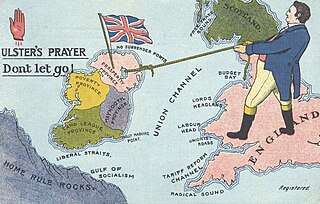
Unionism in Ireland is a political tradition on the island that professes loyalty to the unifying Crown and constitution of the United Kingdom. Once the overwhelming sentiment of a then-ascendant minority Protestant population, in the decades following Catholic Emancipation (1829) it mobilised to oppose the restoration of an Irish parliament. Resurgent as "Ulster unionism", in the century since Partition (1921), its commitment has been to the retention within the United Kingdom of the six Ulster counties that constitute Northern Ireland. Within the framework of a peace settlement for Northern Ireland, since 1998 unionists have reconciled to sharing office with Irish nationalists in a devolved administration, while continuing to rely on the connection with Great Britain to secure their cultural and economic interests.

Sir Jeffrey Mark Donaldson is a British politician who has served as leader of the Democratic Unionist Party (DUP) in Northern Ireland since June 2021. He has been the Member of Parliament (MP) for Lagan Valley since 1997, and leader of the DUP in the UK House of Commons since 2019. He is Northern Ireland's longest-serving current MP.

The 1955 United Kingdom general election was held on Thursday 26 May 1955, four years after the previous general election in 1951. It was a snap election: After Winston Churchill retired in April 1955, Anthony Eden took over and immediately called the election in order to gain a mandate for his government. It resulted in a majority of 60 seats for the government under new leader and Prime Minister Anthony Eden; the result remains the largest party share of the vote at a post-war general election. This was the first general election to be held with Elizabeth II as monarch, having succeeded her father George VI a year after the previous election.

The 1959 United Kingdom general election was held on Thursday, 8 October 1959. It marked a third consecutive victory for the ruling Conservative Party, now led by Harold Macmillan. For the second time in a row, the Conservatives increased their overall majority in Parliament, this time to a landslide majority of 100 seats, having gained 20 seats for a return of 365. The Labour Party, led by Hugh Gaitskell, lost 19 seats and returned 258. The Liberal Party, led by Jo Grimond, again returned only six MPs to the House of Commons, but managed to increase its overall share of the vote to 5.9%, compared to just 2.7% four years earlier.

The Vanguard Unionist Progressive Party (VUPP), informally known as Ulster Vanguard, was a unionist political party which existed in Northern Ireland between 1972 and 1978. Led by William Craig, the party emerged from a split in the Ulster Unionist Party (UUP) and was closely affiliated with several loyalist paramilitary groups. The party was set up in opposition to power sharing with Irish nationalist parties. It opposed the Sunningdale Agreement and was involved in extra-parliamentary activity against the agreement. However, in 1975, during discussions on the constitutional status of Northern Ireland in the constitutional convention, William Craig suggested the possibility of voluntary power sharing with the nationalist Social Democratic and Labour Party. In consequence the party split, with dissenters forming the United Ulster Unionist Party. Thereafter Vanguard declined and following poor results in the 1977 local government elections, Craig merged the remainder of Vanguard into the UUP in February 1978.
The Ulster Unionist Labour Association was an association of trade unionists founded by Edward Carson in June 1918, aligned with the Ulster Unionists in Ireland. Members were known as Labour Unionists. In Britain, 1918 and 1919 were marked by intense class conflict. This phenomenon spread to Ireland, the whole of which was under British rule at the time. This period also saw a large increase in trade union membership and a series of strikes. These union activities raised fears in a section of the Ulster Unionist leadership, principally Edward Carson and R. Dawson Bates. Carson at this time was president of the British Empire Union, and had been predisposed to amplify the danger of a Bolshevik outbreak in Britain.

William "Bill" Craig was a Northern Irish politician best known for forming the Unionist Vanguard movement.
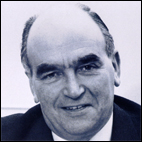
Henry William West was a politician in Northern Ireland who served as leader of the Ulster Unionist Party from 1974 until 1979.

The partition of Ireland was the process by which the Government of the United Kingdom of Great Britain and Ireland divided Ireland into two self-governing polities: Northern Ireland and Southern Ireland. It was enacted on 3 May 1921 under the Government of Ireland Act 1920. The Act intended for both territories to remain within the United Kingdom and contained provisions for their eventual reunification. The smaller Northern Ireland was duly created with a devolved government and remained part of the UK. The larger Southern Ireland was not recognised by most of its citizens, who instead recognised the self-declared Irish Republic. Following the Anglo-Irish Treaty, the territory of Southern Ireland left the UK and became the Irish Free State, now the Republic of Ireland.

Joseph Devlin was an Irish journalist and influential nationalist politician. He was a Member of Parliament (MP) for the Irish Parliamentary Party in the House of Commons and later a Nationalist Party MP in the Parliament of Northern Ireland. Devlin was referred to as "duodecimo Demosthenes" by Tim Healy. He never married.

Albert Glenn Barr OBE was a politician from Derry, Northern Ireland, who was an advocate of Ulster nationalism. For a time during the 1970s he straddled both Unionism and Loyalism due to simultaneously holding important positions in the Vanguard Progressive Unionist Party and the Ulster Defence Association.
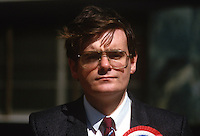
George Seawright was a Scottish-born unionist politician in Northern Ireland and loyalist paramilitary in the Ulster Volunteer Force. He was assassinated by the Irish People's Liberation Organisation in 1987.
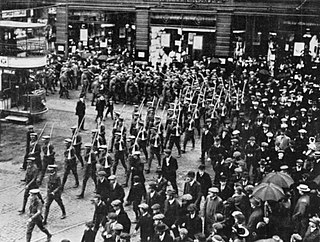
The Ulster Volunteers was a unionist, loyalist militia founded in 1912 to block domestic self-government for Ireland, which was then part of the United Kingdom. The Ulster Volunteers were based in the northern province of Ulster. Many Ulster Protestants feared being governed by a Catholic-majority parliament in Dublin and losing their links with Great Britain. In 1913, the militias were organised into the Ulster Volunteer Force (UVF) and vowed to resist any attempts by the British Government to impose Home Rule on Ulster. Later that year, Irish nationalists formed a rival militia, the Irish Volunteers, to safeguard Home Rule. In April 1914, the UVF smuggled 25,000 rifles into Ulster from Imperial Germany. The Home Rule Crisis was interrupted by the First World War. Much of the UVF enlisted with the British Army's 36th (Ulster) Division and went to fight on the Western Front.

Sir Richard Dawson Bates, 1st Baronet, known as Dawson Bates, was an Ulster Unionist Party member of the Northern Ireland House of Commons.
Andrew Tyrie is an Ulster loyalist paramilitary leader who served as commander of the Ulster Defence Association (UDA) during much of its early history. He took the place of Tommy Herron in 1973 when the latter was killed, and led the organisation until March 1988 when an attempt on his life forced him to resign from his command.
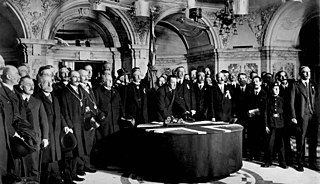
The Home Rule Crisis was a political and military crisis in the United Kingdom of Great Britain and Ireland that followed the introduction of the Third Home Rule Bill in the House of Commons of the United Kingdom in 1912. Unionists in Ulster, determined to prevent any measure of home rule for Ireland, formed a paramilitary force, the Ulster Volunteers, which threatened to resist by force of arms the implementation of the Act and the authority of any Dublin Parliament. Irish nationalists responded by setting up the Irish Volunteers "to secure the rights and liberties common to all the people of Ireland". Both sides then began importing weapons and ammunition from Germany, in the Larne gun-running and Howth gun-running incidents. HM Government's ability to face down unionist defiance was thrown into question by the "Curragh incident", when dozens of British Army officers tendered their resignations rather than secure arms against Ulster loyalist seizure, forcing a climb-down by the government. The crisis was temporarily averted by the outbreak of World War I. The Home Rule Bill was enacted, but its implementation was suspended for the duration of the war.

The February 1974 United Kingdom general election in Northern Ireland was held on 28 February with 12 MPs elected in single-seat constituencies using first-past-the-post as part of the wider general election in the United Kingdom.
















